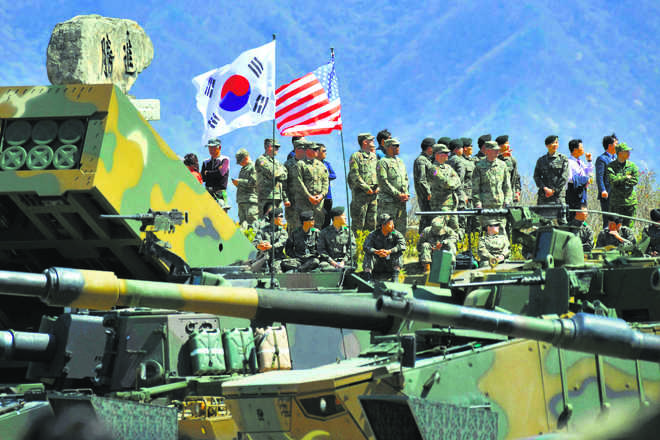
Great Moment: Trump announces the halting of the annual US-South Korean military drills. AFP file photo
Vappala Balachandran
Former Special Secretary,
Cabinet Secretariat
President Donald Trump was criticised at home and abroad for not consulting anybody before announcing his “stunning” decision of halting the annual US-South Korean military drills. He made this declaration during his summit meeting with North Korean President Kim Jong-un in Singapore. One of the reasons cited by him in his long press conference was the cost of flying B-52 bombers from Guam. This was interpreted in some quarters as yet another instance of his impulsive decision-making.
Only the future will tell us whether this decision was wrong. But one thing is certain: Great moments in history are not made through hierarchical decision-making through “advance preparatory work” by diplomats of feuding nations or by “structured agenda”. In fact, such exercises would only make their respective positions harder, making any final decision impossible. The “Hermit Kingdom” has not yielded since the 1950s, despite US efforts directly or indirectly to relax its hostile policy by offering concessions. Reputed think tanks like the Council on Foreign Relations (CFR) had also tried to help policy formulation by forming “task forces” for recommending viable policies to successive US administrations. The CFR report of 1998 felt that “the North’s economic stagnation still could lead Pyongyang toward greater contact and accommodation with the outside world.” But this did not happen.
Nor has military intimidation through joint exercises worked. Called “Foal Eagle” and “Key Resolve” exercises, these drills cost billions. While “Key Resolve” is a command-post exercise on deploying personnel and equipment if there is an attack, “Foal Eagle” is to do large-scale field exercises involving ground, air, naval and special operations personnel. In the past B-52 from Guam, B-2 Spirit Stealth from Missouri and F-22 Raptor Stealth from Japan had participated by dropping “Ordnance” on bombing ranges.
But these drills also bring the whole area under severe tension. In 2009, North Korea threatened South Korean civil airliners during these exercises. Military diplomats might argue that such regular drills are meant to upgrade the allied capabilities and raise confidence among others, like Japan. But equally strong are the fears that North Korea could inflict enormous damage on South Korea and Japan.
Besides, there are historical reasons why North Korea is so annoyed with America. Former Washington Post correspondent Blaine Harden, author of “King of Spies: The Dark Reign of America's Spymaster in Korea”, quotes “Strategic Air Command” General Curtis E LeMay saying that American bombs killed more than 20 per cent of the North Korean population, which was 19,00,000 at that time. The three-year bombing from 1,950 targets located through technical intelligence by American spymaster Donald Nichols “destroyed nearly all of the country's cities and towns.” Thus, options for Trump for Korean peace were limited unless he did some stunning action.
The thrilling Arab-Israeli precedent
There is a precedent here. In November, 1977, an equally thrilling story was unveiled in West Asia which helped apply a dramatic break to the Arab-Israeli hostilities since 1948. Incredibly, this conflict resolution was catalysed not by any government leader, not by diplomats or spy chiefs or think tanks, but by a legendary TV anchor, the late Walter Cronkite. In his book “A Reporter's Life” (1996), he gives only a self-effacing role to himself. However, this dramatic development would not have happened but for him.
On November 11, 1977, Cronkite heard a rumour that Egyptian President Anwar Sadat had told a Canadian parliamentary delegation that he was keen to visit Israel. Cronkite had met Sadat several times earlier to discuss West Asian peace after the death of President Gamal Nasser, especially after the 1973 Yom Kippur war which was disastrous for Egypt. Their economy was in a shambles with 28 per cent of the national budget going for defence. Food riots were occurring. Intelligence was being received that Israeli Prime Minister Menachem Begin was preparing for another war. General Gamassy, defence minister, had warned that Egypt would not be able to withstand another Israeli onslaught. Sadat’s peace offer since 1971 was getting nowhere and the US-sponsored Geneva process was grounded on “procedural nit-picking.” Above all, Sadat was simply disgusted with the Arab habit of fighting Israel “to the last Egyptian.”
Cronkite called Sadat the same day and got an assurance that he was keen to visit Jerusalem. He told him that he would like to go to “the Knesset itself, to talk to them.” Next, Cronkite called PM Menachem Begin at Tel Aviv Hilton and got an assurance from him that an invitation would be issued. Things moved at a frenetic pace — Israeli invitation through the American embassy was delivered on the 14th and Sadat was on Israeli soil five days later.
Sadat flew into a deeply suspicious Israel. There were rumours that the Egyptian plane would be carrying terrorists and not Sadat. But the Knesset heard him in rapt attention. Peace was on the horizon between Israel and Egypt.
There would have been no Jerusalem visit or September 5, 1978 Camp David meetings had Sadat and Begin left their negotiations to bureaucrats to peer over old position papers based on “principled stands,” “precedents” and “reciprocity.” It is true the 13-day Camp David talks did not usher in comprehensive West Asian peace or settle the Palestinian question. But Egypt-Israel peace is holding and Sadat’s “extravagant gamble” made people look at the problem in a “non-traditional way.” That is the significance of Trump’s “Electric Shock” announcement on Korean peace.



























